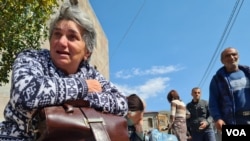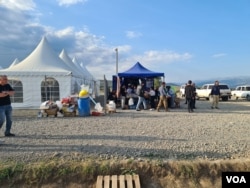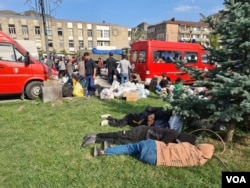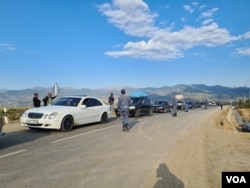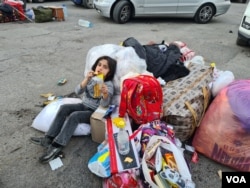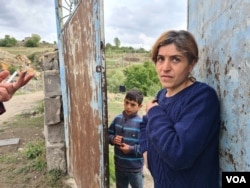The dog's ribs are visible and her owner's skeletal shoulders poke through a gray sweater.
The dog's name is Chalo, essentially "Spot" in Armenian, and the owner, 69, tells us to call her Tamar. She is a refugee in Armenia and wants her real name withheld for security reasons.
We meet her in a park hours after she arrives in Goris, Armenia, where workers man humanitarian tents in the last days of September for the 100,000-plus people fleeing Nagorno-Karabakh.
Tamar brought her dog and a plastic shopping bag of belongings when she fled her home city, which, last week, was called Stepanakert. For most of this year, Stepanakert was cut off from its main supply route, and Tamar, like other residents, was left waiting for days at a time on bread lines, sometimes only to walk away with nothing. She dropped from 56 to 40 kilograms.
"There was mostly no electricity," says Tamar, on the lawn outside a tent in Goris. The dog isn't allowed inside. "We used to sit on the streets of Stepanakert at night together, rather than at home, alone in the dark."
A place of the past
But Stepanakert, in some ways, no longer exists.
It was the capital of the self-declared Republic of Artsakh, which, until last week, was most of Nagorno-Karabakh. The residents, like Tamar, were almost all ethnic Armenians, and Armenia and Azerbaijan have fought over it for decades.
In mid-September, a two-day Azerbaijani assault ended the conflict, with a clear victory for Azerbaijan, which now controls all the land inside its internationally recognized borders.
Khankendi, the Azerbaijani name for Stepanakert, is now mostly deserted. A report on the Al Jazeera television channel shows the central square littered with left-behind chairs, suitcases that didn't fit on buses, and homeless pet dogs.
"It breaks my heart," says Tamar, referring to the dogs.
The buildings still stand in Khankendi and a few aid workers search houses for residents who stayed behind because they are sick, old or have no family to help them evacuate.
Tamar was in one of the last groups to leave late last week, because many buses would take her, but not her dog.
After the vast majority of the residents evacuated last week, the local government dissolved. The land is now in reality what it has long been officially: the Karabakh region of Azerbaijan.
"I had one year left to turn 70 in my own country," says Tamar, as an aid worker stops by to check on her well-being. Chalo is tied to a park bench with a short ribbon and the worker decides to go search for a leash. "I see now it wasn't meant to be."
Scattered past, uncertain future
Over the weekend, the humanitarian tents in Goris are taken down, as refugees board buses and vans to every corner of Armenia. Most want to go to the capital, Yerevan, but officials say there is no room for everyone in the city.
Villages by the border, however, have empty homes and depopulated economies. But upon arrival in Goris, many people balk at the idea of moving to one of these villages. "I just left the war," says Tamar.
In 2020, the last time Armenia and Azerbaijan battled for Nagorno-Karabakh, the violence spilled over the borders into Armenia proper. When we visit Ishkhanasar, a village alongside Azerbaijani mountains, locals are quick to say they fear the refugees moving in may have to evacuate again, eventually.
"It was horrible. We were expecting the house to be blown up at any moment," says Ani Aloyan, a 37-year-old farmer who pops her head out of her metal gate when she sees us speaking to a family from Nagorno-Karabakh who moved in next door. "It was autumn and the fields were dry. When shells fell the fields would burn."
We ask the family next door if they would consider going back to Stepanakert, now Khankendi. Azerbaijan says Armenian residents may take Azerbaijani citizenship without reprisals.
"I would love to go back," says Arevik Sargsyan, 21, on the porch of the farmhouse her family has been sharing with its owners for the past few days. "But it's not possible."
In the '90s, when Armenia took over the land later known as Artsakh and several surrounding areas, more than a half-million Azerbaijanis were displaced. Many of those people are now expected to return. Both sides claim historical ties to the enclave and anger runs deep.
"I don't know how they all lived together before, during Soviet times," Sargsyan says. "But after everything that has been lost we cannot."
Anna Kamay contributed to this report.




